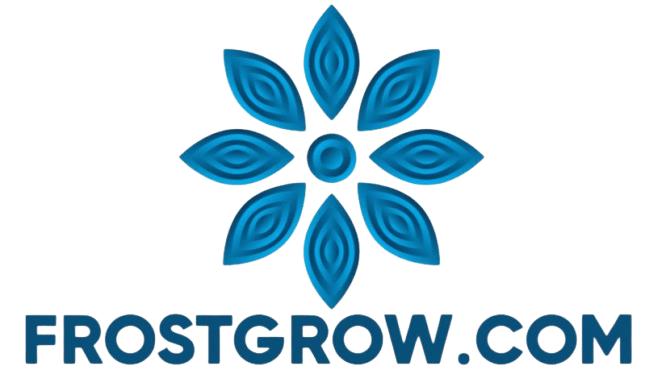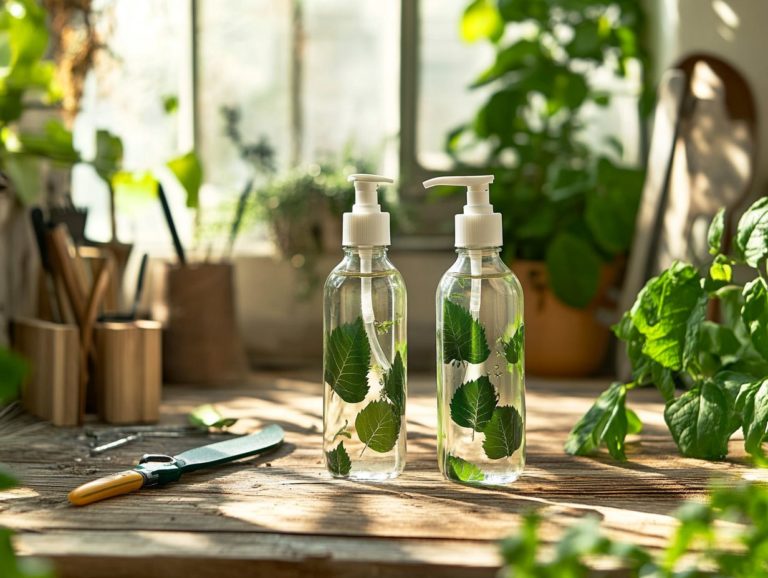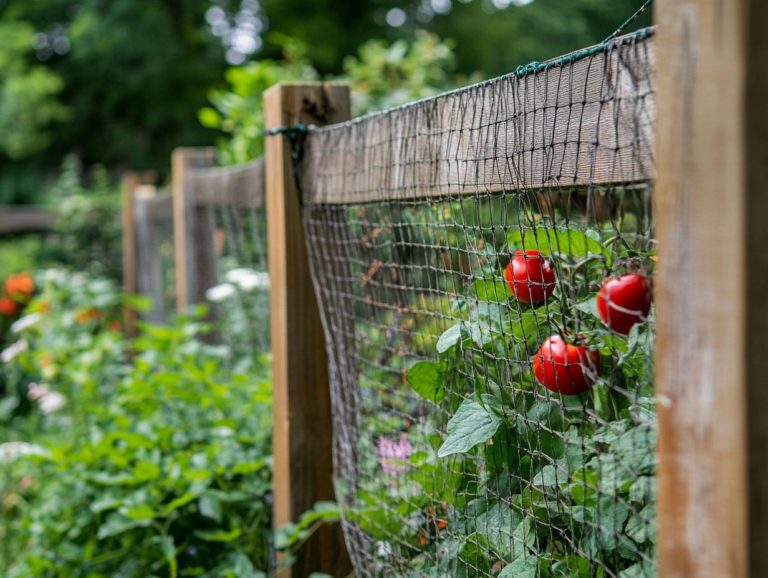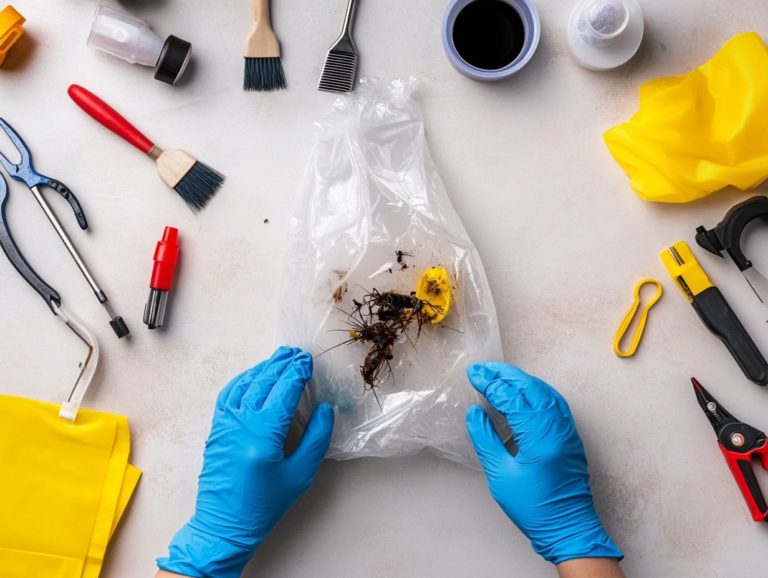5 Essential Resources for Pest Management
When it comes to maintaining a pest-free home, grasping the available tools and strategies in pest management is essential. This article delves into five critical resources for effective pest management. We highlight various pesticides and chemicals, alongside eco-friendly options and natural and organic alternatives. It also emphasizes the essential pest control equipment you need, the significance of educational materials, and the key moments when seeking professional assistance becomes necessary.
With these insights, you will empower yourself to confront any pest challenge you encounter.
Contents
- Key Takeaways:
- 1. Pesticides and Chemicals
- 2. Natural and Organic Solutions
- 3. Pest Control Equipment
- 4. Knowledge and Expertise
- 5. Professional Pest Management Services
- What Are the Different Types of Pesticides and Chemicals Used in Pest Management?
- How Do Natural and Organic Solutions Differ from Chemical Solutions?
- What Are the Essential Pest Control Equipment Every Homeowner Should Have?
- Why Is Knowledge and Expertise Important in Pest Management?
- When Should a Homeowner Consider Hiring Professional Pest Management Services?
- What Are the Benefits of Regular Pest Management Maintenance?
- How Can a Homeowner Prevent Pest Infestations in the First Place?
- What Are the Common Mistakes to Avoid in DIY Pest Management?
- How Can a Homeowner Identify the Signs of a Pest Infestation?
- Ready to take back control of your space? Here are the most effective pest management strategies tailored for various pests!
- Frequently Asked Questions
- What are the 5 essential resources for pest management?
- Why is knowledge crucial for effective pest management?
- What are some necessary equipment for pest management?
- Do I need a pest identification guide for pest management?
- Can I rely solely on DIY pest control products for pest management?
- Why is professional expertise an essential resource for pest management?
Key Takeaways:
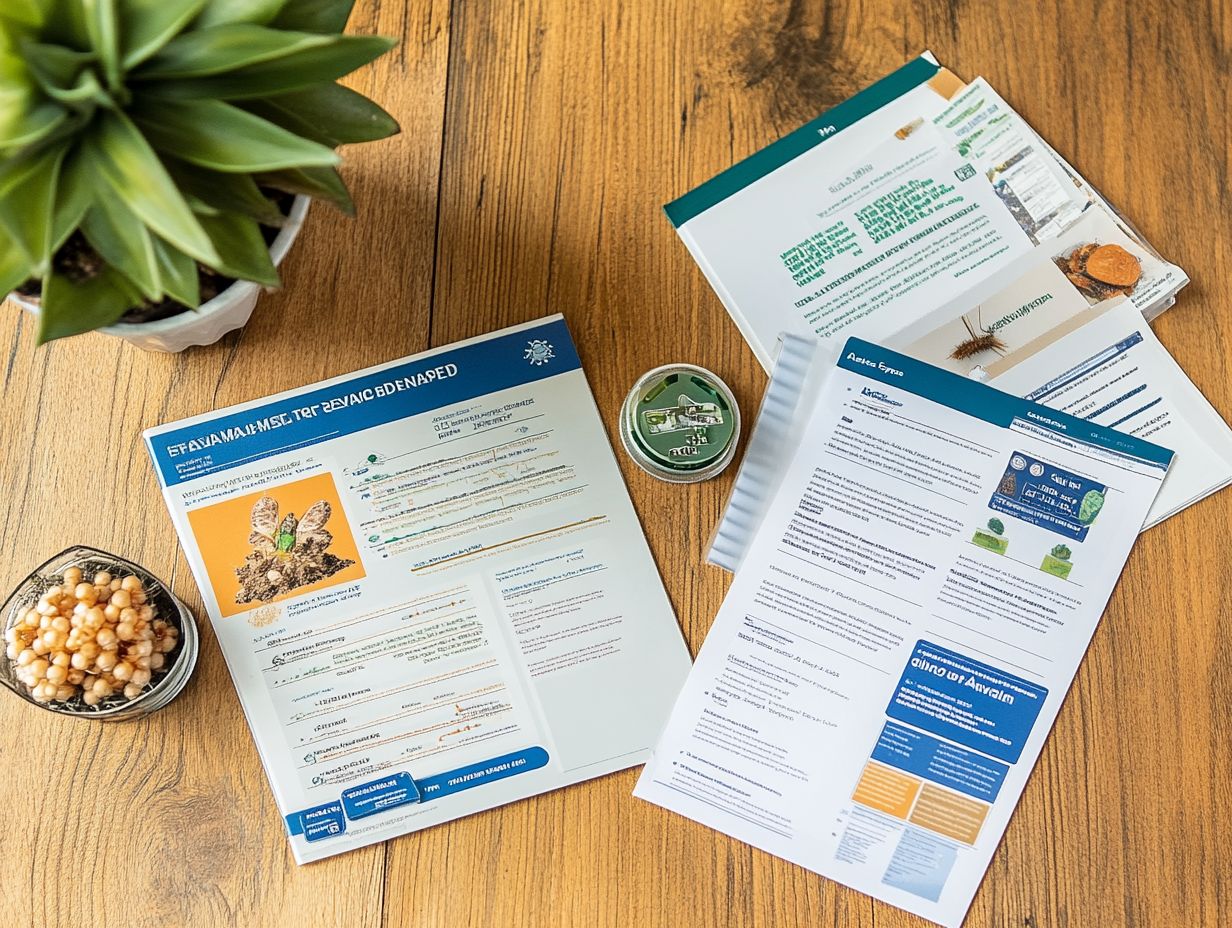
- Use pesticides responsibly to keep your home safe.
- Explore natural solutions for a healthier environment.
- Invest in effective tools to prevent pest issues.
1. Pesticides and Chemicals
Pesticides and chemicals are essential tools for controlling various pests, such as rodents and bed bugs. Ongoing monitoring of pest activity is necessary to ensure the safety and integrity of the properties you oversee as an apartment manager or pest control provider.
Integrated Pest Management (IPM) is a strategy that combines different approaches to control pests effectively. These substances fall into distinct categories, including synthetic chemicals, natural insecticides, and natural pesticides made from living organisms. Each type presents different levels of efficacy, allowing you to customize your strategies according to specific pest pressures and environmental factors.
Emerging innovations like biopesticides are gaining popularity, not only for their lower toxicity to non-target organisms but also for their smooth integration with proactive monitoring protocols. Prioritizing pest sighting protocols is essential. Timely interventions can avert substantial structural damage and help manage pest pressure, ensuring that living spaces remain safe and pest-free.
2. Natural and Organic Solutions
Natural and organic solutions provide you with eco-friendly options for pest control. These methods use natural techniques and beneficial insects to tackle pest infestations without the harsh repercussions tied to traditional pesticides.
By adopting these methods, you decrease reliance on synthetic chemicals. You also foster a healthier ecosystem and practice cultural management. For example, introducing ladybugs and lacewings into your gardens can naturally curb aphid populations, effectively managing infestations while ensuring the safety of non-target species.
Employing cultural management practices, like crop rotation and intercropping, as part of a comprehensive pest management plan creates diverse habitats. These habitats help deter pests and minimize their impact. By implementing these strategies, you enhance the resilience of your crops while contributing to sustainable agriculture.
3. Pest Control Equipment
Having the right pest control equipment is essential for both homeowners and pest management professionals. It significantly enhances your ability to monitor pest activity and implement effective control strategies.
Effective pest management starts with a deep understanding of the unique challenges posed by various insects and rodents. This includes recognizing signs of pest activity. Innovative tools like smart traps and monitoring systems help address these issues.
When selecting equipment, consider the specific types of pests you’re dealing with and the areas that require monitoring. For instance, smart traps equipped with sensors can be particularly beneficial in densely populated spaces. Traditional bait stations might be perfectly adequate for outdoor environments.
Investing in high-quality tools tailored to the specific needs of your pest problem is key to achieving optimal results in your pest management strategies.
Ready to take charge of pest management? Start today!
4. Knowledge and Expertise
Knowledge and expertise in pest management are essential for effectively tackling pest infestations. They empower you as an apartment manager or pest control provider to devise comprehensive plans, including seasonal adjustments for pest management, that minimize structural damage and curb pest activity.
Training your employees empowers them to effectively tackle pest challenges. It enables them to identify pest species with precision, understand their behaviors, and execute targeted interventions effectively.
Without proper education and employee training, you risk misdiagnosing infestations and employing ineffective treatment methods. This can lead to skyrocketing costs and persistent pest problems.
Each staff member, from service technicians to customer service representatives, plays a crucial role in pest management. Their collaborative efforts, including roles in pest management, are vital for ensuring client satisfaction and preserving the integrity of residential properties. Ongoing training is invaluable for adapting to the ever-evolving pest landscape.
5. Professional Pest Management Services
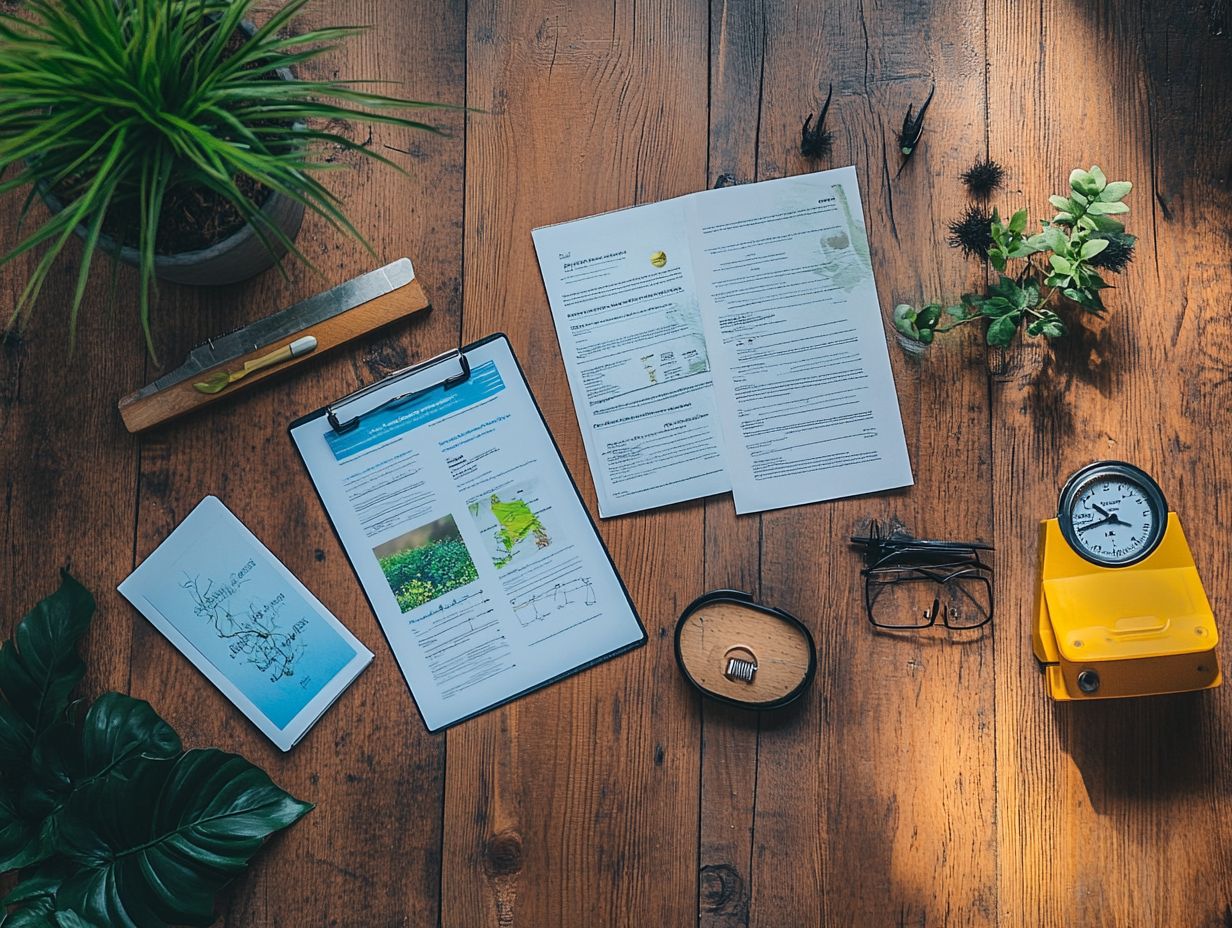
Professional pest management services equip you with specialized expertise and resources to tackle pest infestations effectively, using pest management technology. They employ advanced pest control strategies specifically designed to mitigate pest problems and pest pressure while ensuring full compliance with established protocols and regulations.
These companies offer a comprehensive suite of solutions, ranging from thorough inspections and precise identification to effective extermination and ongoing monitoring. This makes them an invaluable ally in managing pest pressure and implementing pest management best practices.
With knowledgeable technicians who are well-versed in the latest pest trends and pest management processes, these services can be customized to meet the unique requirements of both residential and commercial properties.
Effective pest management solutions often incorporate environmentally friendly products, trapping systems, and integrated pest management plans that include mechanical management and biological management, considering the life cycles of pests. By using these strategies, they not only eliminate current pest infestations but also establish barriers to prevent future occurrences, fostering long-term pest control success.
What Are the Different Types of Pesticides and Chemicals Used in Pest Management?
In pest management, you ll find a variety of pesticides and chemicals at your disposal, including insecticides, fungicides, and herbicides. Each of these plays a vital role in integrated pest management strategies designed to effectively address pest activity.
These categories of pesticides serve unique purposes: insecticides tackle pesky insects, fungicides combat fungal infections, and herbicides deal with unwanted plants. By weaving these agents into a comprehensive pest management plan, you can target specific pest challenges while keeping environmental impact to a minimum.
With advancements in pest management technology, such as precision application methods and biological control options, the efficacy and safety of these products have reached new heights. These innovations not only streamline the application process but also aid in monitoring pest populations for effective management. This ensures that your chosen pest control methods are in harmony with sustainable agricultural practices and public health considerations.
How Do Natural and Organic Solutions Differ from Chemical Solutions?
Natural and organic solutions in pest management stand in stark contrast to their chemical alternatives. They offer eco-friendly alternatives that leverage biological techniques to address pest issues while considering pest management best practices.
This approach not only promotes the use of naturally occurring substances but also aims to foster ecosystem balance the natural equilibrium of plants and animals in an environment protect non-target organisms, and use beneficial insects for effective pest control. Organic solutions like neem oil and diatomaceous earth, a natural powder made from fossilized algae that helps control pests, effectively deter common pests such as aphids and slugs, all while keeping beneficial insects safe as part of your pest management plan.
Conversely, while chemical pesticides may deliver quicker results against severe pest infestations, they come with long-term risks that can jeopardize human health and the surrounding environment, including soil and water contamination. Each method has its particular strengths, making it essential for you to consider your options thoughtfully in the realm of pest management and pest control challenges.
What Are the Essential Pest Control Equipment Every Homeowner Should Have?
As a homeowner, you should equip yourself with essential pest control tools that give you the power to monitor pest activity and implement effective techniques before pest infestations spiral out of control.
A well-rounded toolkit can significantly boost your ability to manage unwanted pests and support pest management professionals. For instance, incorporating 5 techniques for winter pest management can be key items to consider:
- traps and bait stations, which are invaluable for capturing and monitoring pest populations.
- Moisture meters, which help you pinpoint areas that might attract pests.
- Insect vacuums, which provide a non-toxic approach for pest removal.
- Digital monitoring devices, which allow you to track pest movements and develop effective intervention strategies.
By integrating these tools into your regular maintenance routines, you gain the knowledge and resources necessary to maintain a pest-free home, ensuring a healthier and more comfortable living environment.
Why Is Knowledge and Expertise Important in Pest Management?
Knowledge and expertise are essential in your approach to pest management, laying the groundwork for effective strategies for indoor plant pest control that tackle pest control challenges and enhance management processes.
By exploring the intricacies of pest behavior and ecology, you can accurately identify the thresholds that signal when intervention is necessary. This understanding is vital for determining the most appropriate management tactics, balancing environmental responsibility with cost-effectiveness.
Stay updated with the latest research and tools to stay ahead. Emphasizing training not only deepens your comprehension of pest life cycles but also gives you the power to innovate solutions that reduce chemical usage while effectively managing infestations.
When Should a Homeowner Consider Hiring Professional Pest Management Services?
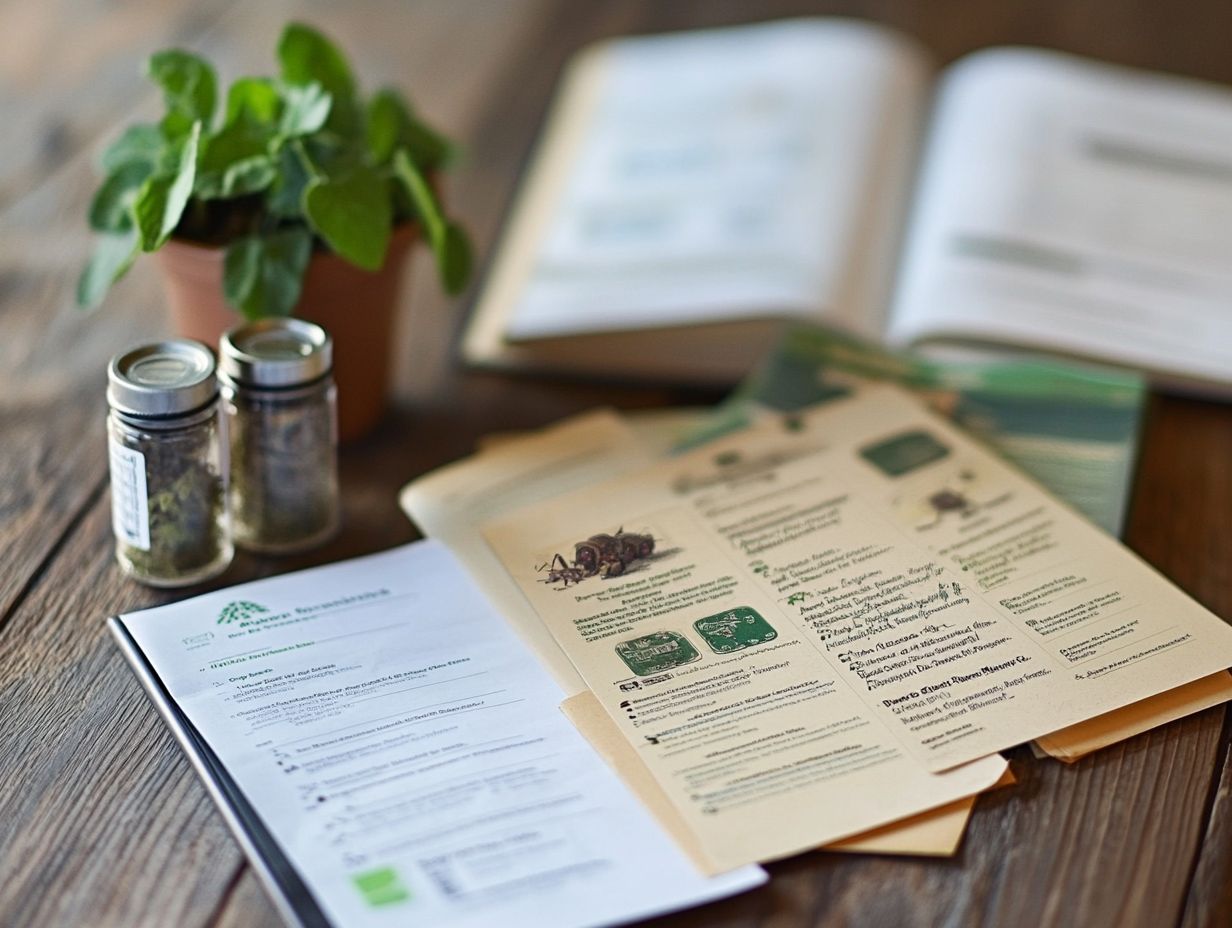
When you notice persistent pest sightings or signs of activity suggesting an escalating infestation, take action now! Consider hiring professional pest management services.
Such scenarios might involve repeated encounters with rodents, visible termite damage, or a surge in insect activity during peak seasons. If you observe areas of structural damage such as crumbling wood or droppings around your property it s a clear indication that professional assistance is necessary.
To find the right provider, seek out companies with strong customer reviews, valid licenses, and transparent treatment plans. It s also a good idea to ask about the types of products they use, ensuring they are safe for children and pets. This approach not only addresses the pest problem but also grants you peace of mind as you take the necessary steps.
What Are the Benefits of Regular Pest Management Maintenance?
Regular pest management maintenance brings a wealth of advantages, including proactive pest monitoring and timely control strategies that keep infestations at bay.
By adopting a structured routine, you are likely to notice a significant drop in pest activity while also fortifying your defenses against future invasions. This approach cultivates a more comfortable living environment and enhances your property s value, as a well-maintained space reflects care and attention to detail.
Effective pest management reduces health risks tied to infestations. This allows you and your residents to enjoy true peace of mind. A strong pest management plan is a smart investment in your well-being and your property s safety.
How Can a Homeowner Prevent Pest Infestations in the First Place?
Preventing pest infestations starts with employing effective pest management strategies, such as cleaning and organizing routines and providing comprehensive training for any applicable staff to uphold pest sighting protocols.
Regular home inspections are essential for spotting potential issues before they spiral out of control. Pay attention to sealing cracks and crevices, as these openings can become gateways for various pests.
Maintaining a high standard of cleanliness by tidying up kitchens and dining areas can significantly reduce food sources that attract unwanted guests. Proper lawn care techniques eliminate habitats for bothersome critters, while ensuring adequate drainage helps prevent moisture buildup.
By implementing these measures, you create a less inviting environment for pests and embrace a proactive approach to pest management.
What Are the Common Mistakes to Avoid in DIY Pest Management?
Avoiding common mistakes is key to your success in DIY pest management. Skipping the vital step of regularly monitoring pest populations can allow infestations to go unnoticed.
When applying pesticides, using improper techniques like inadequate coverage or incorrect dosages can diminish effectiveness and pose health risks to your family and pets.
Boost your pest control success with these simple steps:
- Familiarize yourself with the specific pests you re dealing with.
- Invest in proper application tools.
- Maintain a consistent monitoring schedule.
Employing Integrated Pest Management (IPM) techniques can yield better results by blending effective prevention strategies with minimal chemical use. Taking these actions can make all the difference in achieving a pest-free home.
How Can a Homeowner Identify the Signs of a Pest Infestation?
Identifying the signs of a pest infestation is essential for homeowners. Early detection of pest activity can dramatically enhance the effectiveness of the pest control measures employed by professionals.
Watch for indicators like droppings hidden in corners, visible structural damage like chewed wood, and even those unsettling moments when you actually spot a pest. These observations can differentiate a minor issue from a full-blown infestation.
Staying vigilant is crucial; keep an eye out for these warning signs and implement regular monitoring practices. Report these indicators promptly to pest control experts to facilitate a swift resolution of any current issues and foster a proactive strategy against potential infestations. This approach ensures a healthier living environment for you and your family.
Ready to take back control of your space? Here are the most effective pest management strategies tailored for various pests!
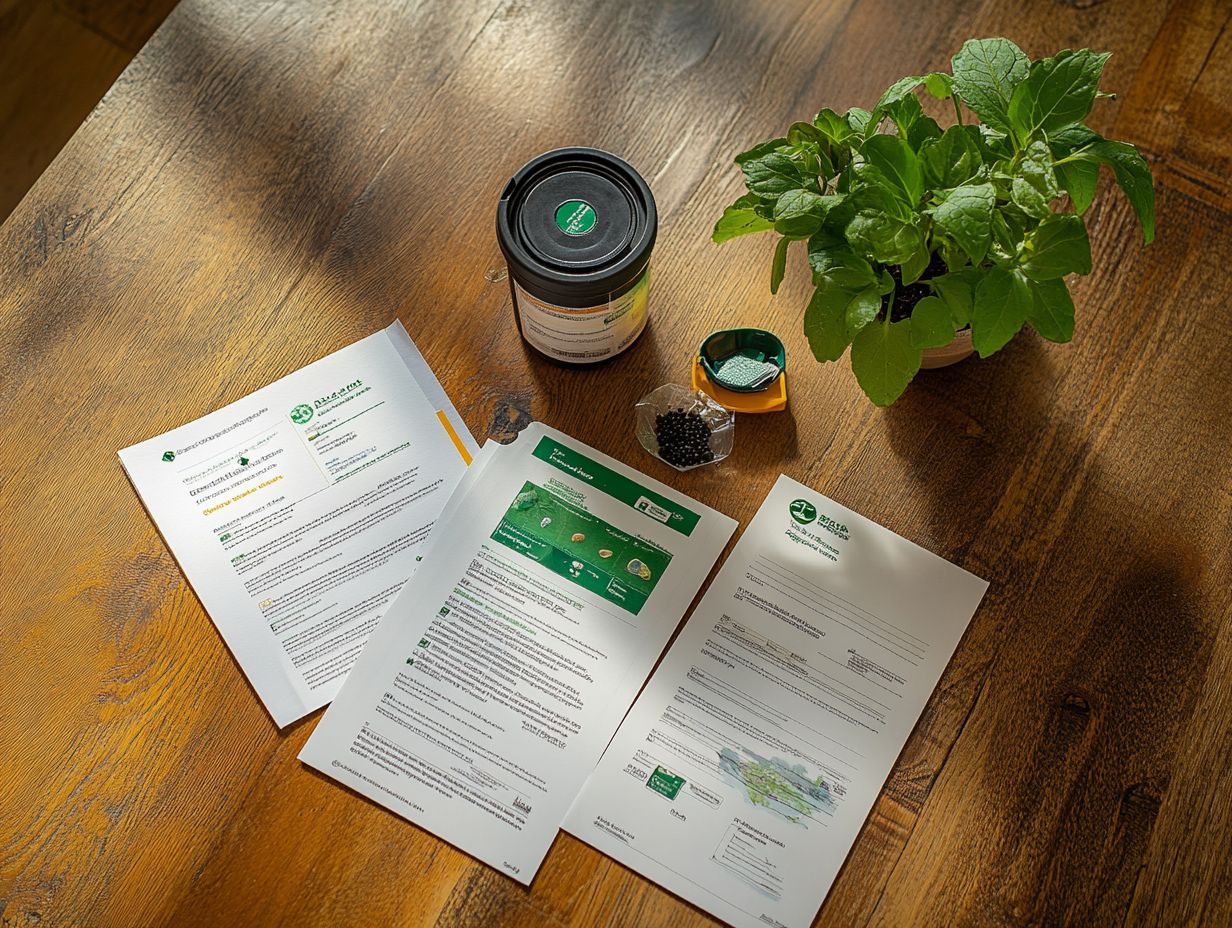
Different types of pests require tailored management strategies to ensure effective control, underscoring the importance of understanding specific pest behaviors and the most suitable techniques to employ.
For instance, when dealing with challenges like rodents or bed bugs, it’s vital for you to implement a combination of methods. This holistic approach weaves together various techniques such as biological control, habitat manipulation, and mechanical barriers, creating a sustainable environment that deters infestations.
Pest management professionals are essential in this process, leveraging their expertise to assess the specific conditions contributing to your pest problems. By adopting these methods, you can eliminate current pests and prevent future infestations, ultimately fostering a healthier living space.
Frequently Asked Questions
What are the 5 essential resources for pest management?
- Knowledge
- Proper equipment
- Pest identification guide
- Pest control products
- Professional expertise
Why is knowledge crucial for effective pest management?
Having knowledge about different types of pests, their behavior, and potential infestation areas is essential for creating an effective pest management plan.
What are some necessary equipment for pest management?
Some necessary equipment for pest management includes sprayers, dusters, bait stations, and protective gear like gloves and masks.
Do I need a pest identification guide for pest management?
Yes, a pest identification guide is a valuable resource for correctly identifying pests and determining the most effective pest control methods.
Can I rely solely on DIY pest control products for pest management?
While DIY pest control products can be effective for minor pest problems, it is always best to consult with a professional for more severe or recurring infestations.
Why is professional expertise an essential resource for pest management?
Professional expertise ensures that pest problems are addressed correctly and effectively, reducing the risk of further infestations and potential harm to health and property.
Act now to protect your home from unwanted pests!
